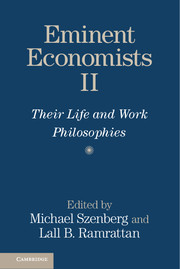Book contents
- Frontmatter
- Dedication
- Contents
- List of Contributors
- Foreword
- Preface and Acknowledgments
- Introduction
- 1 Being There: An Intellectual Journey
- 2 Social Norms in Economics and in the Economics Profession
- 3 Personal Reflections on My Professional Life
- 4 Gray Eminence?
- 5 Biochemist to Economist
- 6 Puzzles and Paradoxes: A Life in Applied Economics
- 7 Succeeding in Economics
- 8 My Research Strategy
- 9 My Philosophy of Economics, Life, and Everything (Not!)
- 10 Finding a Niche
- 11 Become an Economist – See the World
- 12 Practitioner of the Dismal Science? Who, Me? Couldn’t Be!!
- 13 One Job, Four Careers
- 14 My Life and Research Strategy
- 15 How I Ended Up Being a Multifaceted Economist and the Mentors I Have Had
- 16 Searching for My Personal Philosophy
- 17 Learning about the Evolving International Economy
- 18 Confessions of a Wellesley FEM
- 19 God, Ants, and Thomas Bayes
- 20 The Path of a Monetary Economist
- 21 Learning from the Field
- 22 Order in and through Disorder: The Invisible Hand as a Turbulent Regulator
- 23 The Education of an Economist
- 24 Faith, Science, and Religion
- 25 My Studies in International Economics
- 26 Sailing into the Wind
- 27 My Life and Work Philosophy
- 28 Scaling Fortress Economics
- 29 The Accidental Economist
- Index
- References
22 - Order in and through Disorder: The Invisible Hand as a Turbulent Regulator
Published online by Cambridge University Press: 05 June 2014
- Frontmatter
- Dedication
- Contents
- List of Contributors
- Foreword
- Preface and Acknowledgments
- Introduction
- 1 Being There: An Intellectual Journey
- 2 Social Norms in Economics and in the Economics Profession
- 3 Personal Reflections on My Professional Life
- 4 Gray Eminence?
- 5 Biochemist to Economist
- 6 Puzzles and Paradoxes: A Life in Applied Economics
- 7 Succeeding in Economics
- 8 My Research Strategy
- 9 My Philosophy of Economics, Life, and Everything (Not!)
- 10 Finding a Niche
- 11 Become an Economist – See the World
- 12 Practitioner of the Dismal Science? Who, Me? Couldn’t Be!!
- 13 One Job, Four Careers
- 14 My Life and Research Strategy
- 15 How I Ended Up Being a Multifaceted Economist and the Mentors I Have Had
- 16 Searching for My Personal Philosophy
- 17 Learning about the Evolving International Economy
- 18 Confessions of a Wellesley FEM
- 19 God, Ants, and Thomas Bayes
- 20 The Path of a Monetary Economist
- 21 Learning from the Field
- 22 Order in and through Disorder: The Invisible Hand as a Turbulent Regulator
- 23 The Education of an Economist
- 24 Faith, Science, and Religion
- 25 My Studies in International Economics
- 26 Sailing into the Wind
- 27 My Life and Work Philosophy
- 28 Scaling Fortress Economics
- 29 The Accidental Economist
- Index
- References
Summary
Origins and Early Influences
I was born in 1945 in Karachi, Pakistan, two years before the partition of India. My early years were spent in Karachi, but after my father joined the Pakistani Foreign Service in 1948, I also lived in Ankara, Washington, DC, New York, Lagos, Kuala Lumpur, and Kuwait. I received a BSE from Princeton University in 1965, worked for two years in Kuwait (as an engineer and as a teacher of social science and physics), and returned to the United States to study at Columbia University, from which I received my PhD in economics in 1973. In 1972 I joined the Economics Department at the Graduate Faculty of the New School for Social Research, where I am presently employed.
My mother was a Christian from the south of India, and my father was a Muslim from the north. Both were educated and well read, and believed in social and gender equality. My father was an articulate speaker with a wry sense of humor, and my mother a gifted teacher with an ear for language. They made sure that my sister, brother, and I were very well schooled and taught us the importance of self-reliance. I spent my early years in an apartment building occupied largely by various members of my father’s extended family, ranging from grandparents to toddlers. My favorite grand-aunt was English. Once my parents began to travel on various postings, I moved from country to country and school to school. I am told that at the age of six I briefly attended a French school in Ankara but was somewhat handicapped by the fact that I did not speak a word of French. A transfer to a one-room schoolhouse run by an Englishwoman solved that problem. When I was in Catholic secondary school in Karachi my best friend was Zoroastrian, in high school in Washington, DC, my best friend was Chinese American, and in Stuyvesant and Princeton my best friends were Jewish. I did not actually notice any of this at the time. It seemed normal.
- Type
- Chapter
- Information
- Eminent Economists IITheir Life and Work Philosophies, pp. 338 - 351Publisher: Cambridge University PressPrint publication year: 2014



